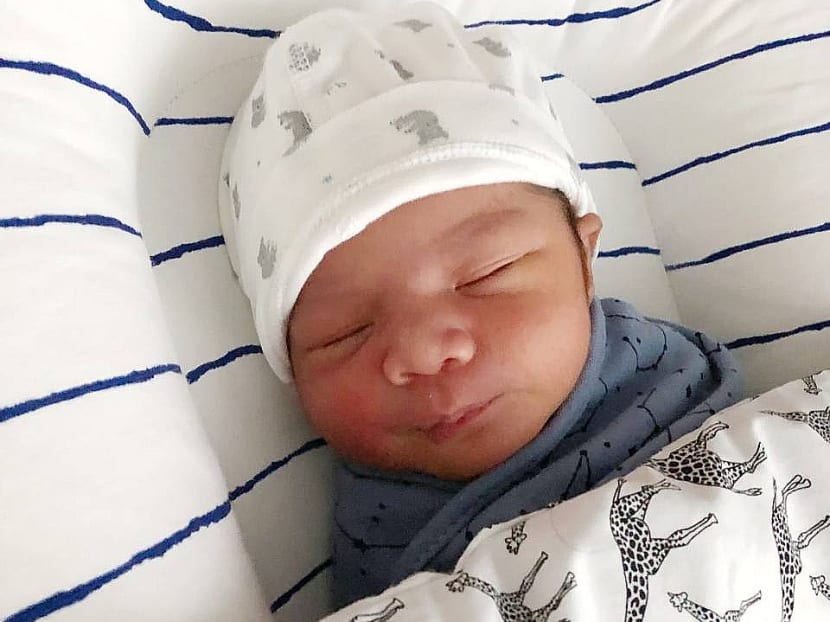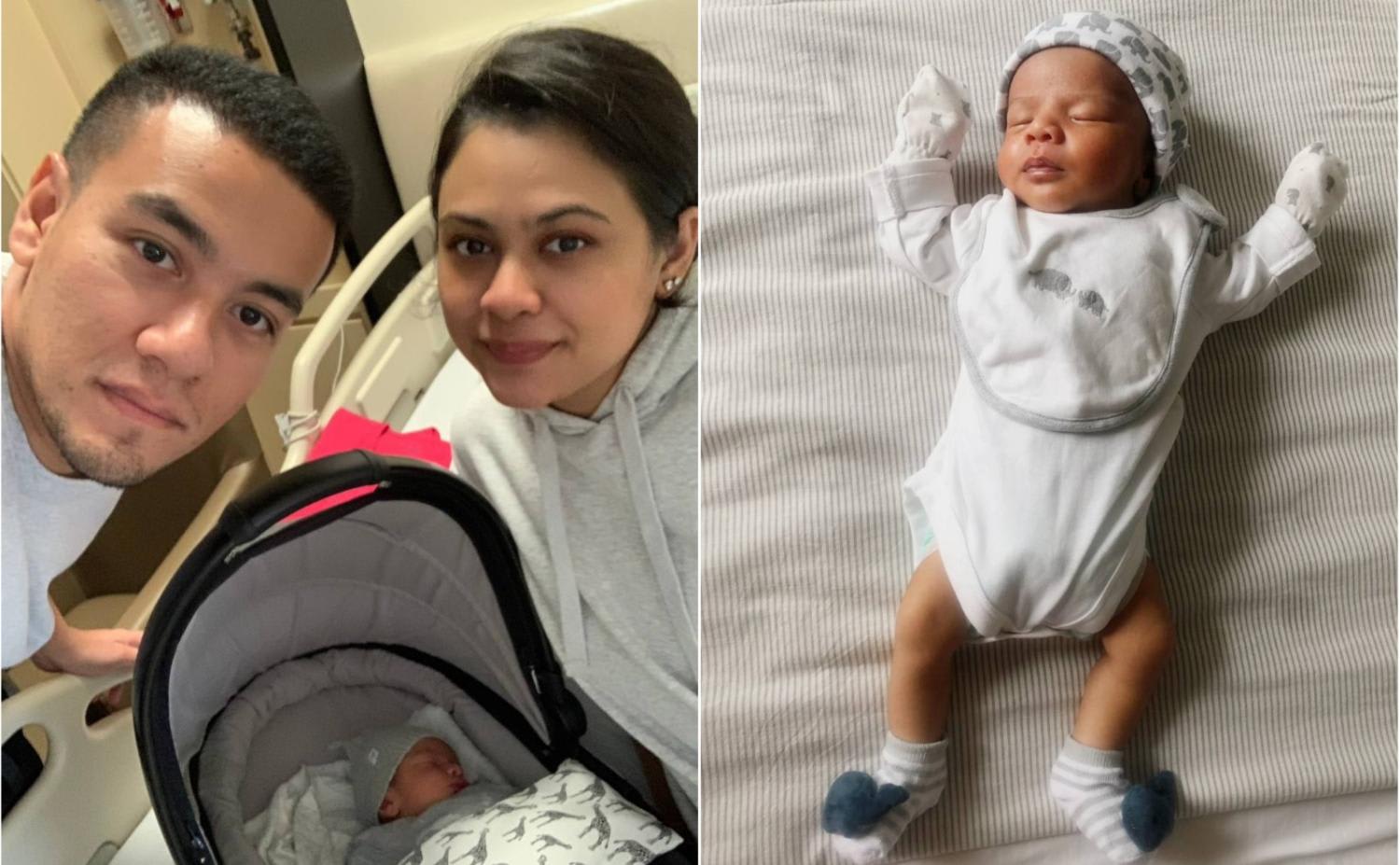Baby in NUH ICU with severe disease, parents hope to raise S$3 million for 'world's most expensive drug'
SINGAPORE — It has been almost a month since Mr Nabeel Salim Abdat and his wife Syahirah Yakub have held their two-month-old son in their arms. Their baby is the youngest in Singapore to be diagnosed with Type 1 spinal muscular atrophy.

Zayn Nabeel Abdat (pictured) has Type 1 spinal muscular atrophy, which can occur within an infant’s first six months of life.
- Zayn Nabeel Abdat, a two-month-old baby, was diagnosed with Type 1 spinal muscular atrophy on Aug 12
- His parents, who got married last year, are raising money to pay for a S$3 million treatment he needs
- The baby boy is now warded in an intensive care unit at National University Hospital
- His parents recounted how he had some worrying symptoms before his diagnosis and then stopped breathing while warded
- They have been getting some support from parents whose children has the same rare condition
SINGAPORE — It has been almost a month since Mr Nabeel Salim Abdat and his wife Syahirah Yakub have held their two-month-old son in their arms.
Their baby is the youngest in Singapore to be diagnosed with Type 1 spinal muscular atrophy, a genetic condition of the central nervous system that affects nerves and muscles, which progressively worsens over time if not treated.
The only hope for their only child, Zayn Nabeel Abdat, is a S$3 million medication called Zolgensma — a one-time treatment dubbed the world’s most expensive drug.
The couple, who got married just last year, now has to raise money for this. Mr Nabeel, 30, a former data centre engineer, is in the midst of a job change. Ms Syahirah, 31, is in between contracts with a government agency and is unemployed.
There is no publicly available data on the number of spinal muscular atrophy cases in Singapore, but figures from the Nationwide Children's Hospital in the United States showed that one in 6,000 babies are born with this disease.
Among the four types of spinal muscular atrophy, Type 1 is considered the most severe, occurring within an infant’s first six months of life.
Infants who have Type 1 will have difficulty swallowing and sucking, among other things, and most do not live past two years of age.
For Zayn, his lungs have collapsed and he is intubated in the intensive care unit (ICU) of the National University Hospital (NUH).
If his family raises enough money, Zayn will be able to undergo the one-time gene therapy to stop the progression of the disease.
“We really need to do this treatment as early as possible… as long as he is still breathing, we’ll still fight for him,” Ms Syahirah said.
She and her husband have not been able to hold their baby because he is intubated and is reliant on a feeding tube.
DOCTOR DETECTED PROBLEM WITH REFLEXES
Zayn has not been an active baby, but his parents thought nothing of it because he was born on July 7 and was barely a month old when he was diagnosed.
“We thought it was normal for a baby this young to not move too much,” Mr Nabeel said.
A week after he was born, Ms Syahirah’s mother tested positive for Covid-19. As a precaution, she and Mr Nabeel took Zayn to KK Women’s and Children’s Hospital (KKH) where he was warded for a fever and given antibiotics. Zayn did not test positive for Covid-19.
He was discharged on July 16, but Ms Syahirah noticed that he had an “odd breathing pattern”, so she took him back to KKH and he was warded again.
“We knew babies should not be snoring, and he also made this wheezing sound. He was warded because he was still running a fever, so when his fever improved, (the doctors and I) thought nothing of it and we went back home,” she said.
They used a nasal spray prescribed to Zayn for a week, but with no improvements to his condition, Ms Syahirah and Mr Nabeel sought a second opinion from a paediatrician.
The doctor suspected that it was stridor — a noise caused when something obstructs the voice box — caused by phlegm.
However, the baby’s lack of reflex caused some concern.
“When the doctor checked Zayn’s reflexes, he had no reaction when tapped, so the doctor said that he was a bit ‘floppy’ and referred us to a neurologist at NUH,” Ms Syahirah recalled.
The appointment with the neurologist was on Aug 5, but four days before that, Zayn’s appetite started dropping.
By Aug 4, he drank just 10ml of milk in half an hour, a sixth of what he would have usually consumed.
“We thought something was not right, so we took him to the hospital,” Ms Syahirah said.
“I never want to go through that ever again… I’m just thankful it happened while I was awake and we took him to the A&E on the right day at the right time.Mr Nabeel Salim Abdat, 30, on the moment in hospital when he realised his baby was not breathing”
They went to the accident and emergency (A&E) unit of NUH at about 4pm to 5pm and he was warded at about 10pm to 11pm.
HE STOPPED BREATHING
Due to Covid-19 restrictions, vulnerable patients can only have one caregiver in the ward with them. It was Mr Nabeel who stayed with Zayn in the ward.
The father said: “When I was filling the administration form, I heard him cry for a bit, but just 30 seconds later, he was unconscious and wasn’t breathing.
The nurses noticed that and performed cardiopulmonary resuscitation (CPR) on Zayn before moving him to the ICU.
Mr Nabeel said: “I never want to go through that ever again… I’m just thankful it happened while I was awake and we took him to the A&E on the right day at the right time.”
Zayn underwent a blood test and was diagnosed with Type 1 spinal muscular atrophy on Aug 12.
“We are devastated… nobody wants to see their child (in this state),” Mr Nabeel added.
COSTLY MEDICATION
For now, Zayn has started taking Risdiplam, a drug that helps to increase the production of a protein — also known as the “survival motor neuron” — which is lacking in spinal muscular atrophy patients.
Treatment with Risdiplam costs S$15,000 and will last Zayn just 64 days due to its short shelf life.
Hopefully, it will help strengthen Zayn enough to breathe without intubation and get ready for the Zolgensma treatment.
His parents also hope that getting off intubation might mean that their baby could leave the ICU and return home.
Even if they can get their child to receive the Zolgensma therapy, Mr Nabeel and Ms Syahirah know that Zayn will have to go through physiotherapy and other treatments after that.

The parents now stay in a room at the hospital, allocated to parents of children in the ICU.
Their days are spent looking at Zayn in his ward before returning to their room close by to rest.
This is far from what they had envisioned in being first-time parents, of spending their days playing with their baby at home and taking him on family trips.
Now, all they want is to give their child a fighting chance at life.
Whenever they see Zayn respond to their presence, to the toys and play cards, it gives them hope for his recovery.
They also said that support from friends, family and parents of children with spinal muscular atrophy have helped them.
“About 10 families have reached out to us, comforting us, giving advice, which really helps us feel less alone,” Ms Syahirah said, adding that the families are based in Singapore and around the world.
“Every parent’s dream (is) for their child to grow up healthy and happy. We hope Zayn can grow up as healthy as possible… we are hoping for the best.
"I really just want to hold him in my arms again."
To donate to Zayn’s medication, visit the family’s fundraiser site.











